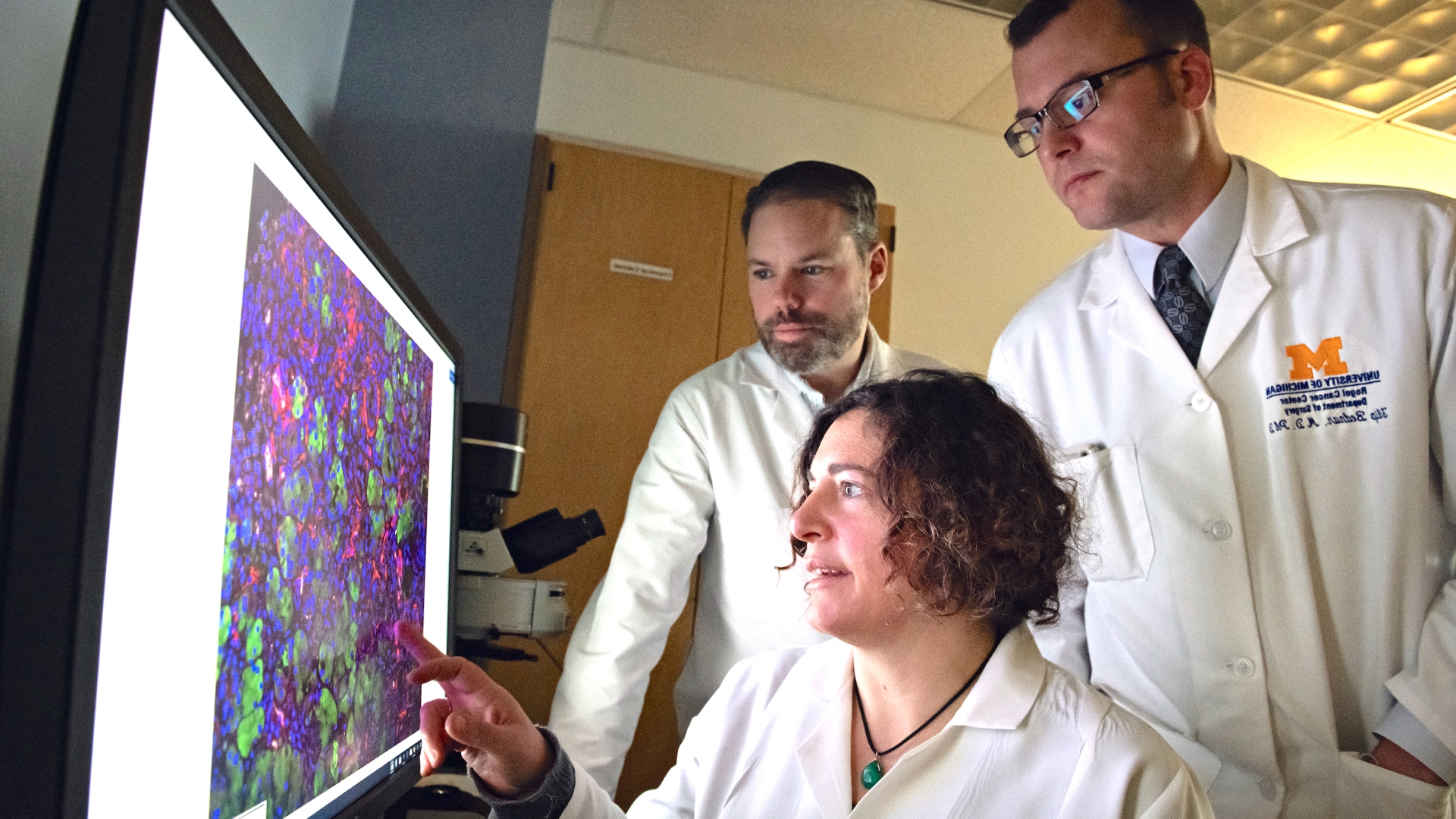The Pasca di Magliano Lab, led by Marina Pasca di Magliano, Ph.D., seeks to understand tumor immunology and the microenvironment in pancreatic cancer.

As one of the world's leading research groups focused on pancreatic cancer, the Pasca di Magliano Lab, led by Marina Pasca di Magliano, Ph.D., studies how this aggressive disease develops and interacts with its microenvironment to fuel growth and resist treatment. Tumor cells recruit a host of cell subtypes to support their survival. This mix of cells in the tumor microenvironment is of great interest to investigators because it contributes in important ways to disease progression and treatment resistance. Our work investigates how. Through basic science and translational investigations and our use of novel models and platforms, we explore interactions among pancreatic cancer cells and the many cell types of the microenvironment. Our aim is to identify the mediators of these processes so that we can slow or prevent pancreatic cancer development and progression to save lives. Our work has been continuously funded by the National Cancer Institute, the American Cancer Society, Pancreatic Cancer Action Network and other agencies and organizations.
The incidence of pancreatic cancer is rising and, despite advances in treating other cancer types, it remains one of the deadliest, with five-year survival rates still under 10 percent. Several factors contribute to the high mortality rate. With few and often non-specific symptoms, early detection is rare. Even in its earliest stages, cancer cells often already have metastasized to other parts of the body. In addition, pancreatic cancer grows in ways that make surgical removal difficult. Only about 20 percent of patients present with operable tumors. It's also resistant to many common treatments.
As in other forms of cancer, pancreatic tumor cells recruit immune cells to the microenvironment. But rather than protect the patient against tumor growth, these immune cells are reprogrammed by the tumor to support its growth. Using the patient's own immune system to fight cancer, known as immunotherapy, has been actively pursued against other tumor types, but it's not working nearly as well as we would like against pancreatic cancer.
To improve treatment and, ultimately, prevention, we need a deeper understanding of pancreatic tumor biology. We also need to better understand the complex, reciprocal interactions among the many cell types, signaling molecules and structural matrices present in the tumor microenvironment. This will help us learn which factors make the environment surrounding the tumor supportive of, and detrimental to, cancer maintenance and progression.
Our laboratory investigates many pathways involved in initiation, progression and treatment resistance of pancreas cancer. Examples include:
- The genes, mutations and epigenetic changes that lead to the initiation of pancreatic cancer.
- Signaling molecules and pathways, such as Sonic Hedgehog, involved in pancreas cancer development and progression.
- The role immune cells play in suppressing the immune system so cancer cells can evade destruction.
- The role of the tumor microenvironment and crosstalk as well as the mechanisms by which pancreatic cancer resists — or becomes sensitive to — treatment.
Better understanding the many pathways implicated in pancreatic cancer will guide us to more effective treatments to help save patients' lives.
Our investigators have made numerous contributions over the years that advance the understanding of pancreatic cancer initiation and growth. For example, our research has established the critical role of the tumor microenvironment in pancreatic cancer development and progression. We have identified the mechanisms involved in key signaling pathways, including how tumor cells communicate reciprocally with the microenvironment and reprogram it to support cancer growth. We have identified the role of impaired proteins at multiple stages of the disease. Since no inhibitor targeting these dysfunctional proteins currently exists, our work underscores the potential of new therapeutic approaches that instead target subsequent proteins in the signaling process. Another important contribution of our investigators has been the development of new murine models that more closely resemble pancreatic cancer in humans. This enables us to analyze disease progression in a stepwise manner much as it progresses in human disease, and to manipulate the tumor microenvironment to better understand its functional biology.
More recently, we have begun to analyze human tissue samples across a range of advanced platforms, including single-cell sequencing of multiple cell types in the tumor microenvironment, to learn how these cells interact. Our new methods are providing a deep look at gene expression at the single-cell level. As a result, we're gaining a greater understanding of the mutations that drive tumor initiation and progression. Growing and optimizing three-dimensional cultures from patient samples, including immune cells, helps us provide valuable patient-specific data to medical oncologists to help determine the most effective treatment regimens and assess response. This work is moving us toward novel precision-medicine approaches.